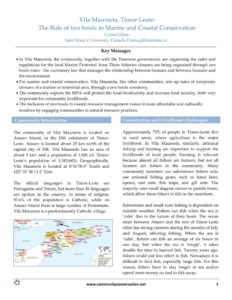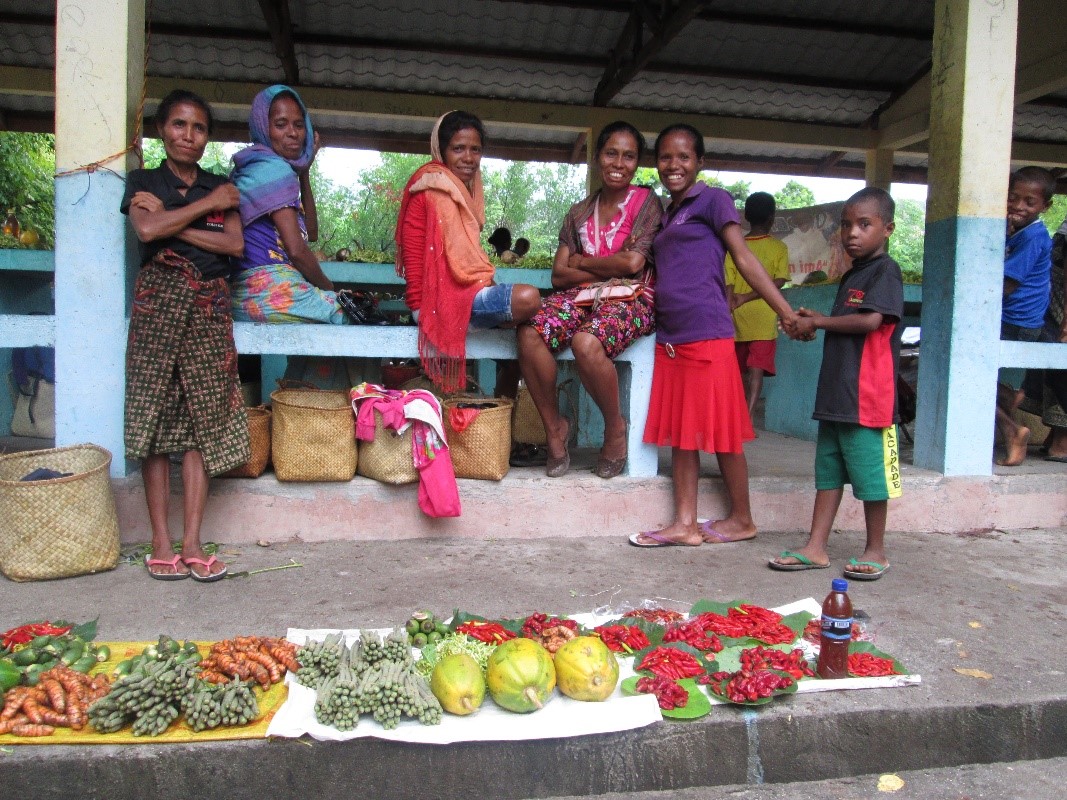
27 Nov Vila Maumeta, Timor-Leste: Tara Bandu in Marine and Coastal Conservation
Cintia Nascimento
Saint Mary’s University, Canada; Cintia.Nascimento@smu.ca
Key Messages
• In Vila Maumeta, the community, together with the Timorese government, are organizing the rules and regulations for the local Marine Protected Area. These fisheries closures are being organized through tara bandu rules – the customary law that manages the relationship between humans and between humans and the environment.
• For marine and coastal conservation, Vila Maumeta, like other communities, sets up rules of temporary closures of a marine or terrestrial area, through a tara bandu ceremony.
• The community expects the MPA will protect the local biodiversity and increase food security, both very important for community livelihoods.
Community Introduction
The community of Vila Maumeta is located on Atauro Island, in the Dili subdistrict of Timor-Leste. Atauro is located about 25 km north of the capital city of Dili. Vila Maumeta has an area of about 3 km² and a population of 1,826 (cf. Timor-Leste’s population of 1,183,643).
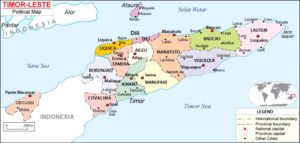
Geographically, Vila Maumeta is located at 8°16’06.9” South and 125° 33′ 36’11.2” East. The official languages in Timor-Leste are Portuguese and Tetum, but more than 16 languages are spoken in the country. In terms of religion, 97.6% of the population is Catholic, while on Atauro Island there is large number of Protestants. Vila Maumeta is a predominantly Catholic village.
Conservation and Livelihood Challenges
Approximately 75% of people in Timor-Leste live in rural areas, where agriculture is the major livelihood. In Vila Maumeta, similarly, artisanal fishing and farming are important to support the livelihoods of local people. Farming is relevant because almost all fishers are farmers, but not all farmers are fishers in the community. Many community members are subsistence fishers who use artisanal fishing gears, such as hand lines, spears, cast nets, fish traps, and gill nets. The majority uses small dugout canoes or paddle boats, which allow these fishers to fish in the nearshore.
Subsistence and small scale fishing is dependent on suitable weather. Fishers can fish when the sea is ‘calm’ due to the nature of their boats. The ocean strait between Atauro and the rest of Timor-Leste often has strong currents during the months of July and August, affecting fishing. When the sea is ‘calm’, fishers can fish an average of six hours in one day, but when the sea is ‘rough’, it takes double the time to harvest fish. Twenty years ago, fishers could put less effort to fish. Nowadays it is difficult to find fish, especially large fish. For this reason, fishers have to stay longer at sea and/or spend more money on fuel to fish away.
There is limited infrastructure in terms of roads and power generation and distribution in rural Timor-Leste. Currently, Atauro Island has a diesel powered generator that produces electricity for the Island. There is power available from 6 pm to 7 am, and 8am to 12 pm (17 hours a day). For this reason, there is lack of refrigeration to store fish and other foodstuff, and consequently, it is difficult to open new markets for local fishers and farmers. Women sell their dried fish in the Beloi’s market (neighboring community), but dried fish is less valuable than fresh fish.
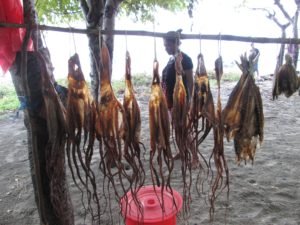
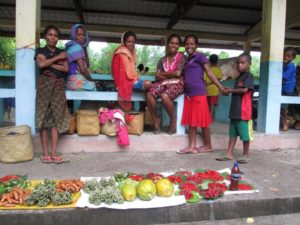
Women selling vegetable at the Beloi Market
Climate change has been affecting community members through a lengthening dry season. Farmers rely on the rainy season to plant. Prior to the 1980s, the rainy season began in November and lasted until April. Nowadays, the rainy season lasts from December to February. People plant crops that can withstand the long dry season, such as beans, pumpkin, cassava and maize. There is a water shortage in the community, as there are only two main sources of spring water, one in Vila and another in Maquili (a neighboring village).
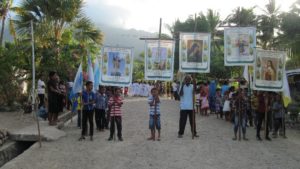
Celebration of Virgin Fatima: Catholic procession, Vila Maumeta, 2017
Community Initiative
Local communities use traditional conservation practices through tara bandu rules to implement temporary fishing, hunting and harvesting closures in certain areas. In Tetum, the term tara bandu means prohibition (bandu) by hanging (tara).
The traditional management regime tara bandu is a long-established Timorese custom that guides people’s interactions with one another and with the environment. Tara bandu is a code of behavior that is used in addressing existing conflicts and the prevention of other potential conflicts. Tara bandu uses local conservation knowledge and expands the social networks of villagers to reinforce community connections. It helps to protect the environment by setting out guidelines for harvesting natural resources and for imposing penalties for those who violate them.
The Vila Maumeta community, with the support of the NGO Roman Luan and the Timorese government, organized community members to demarcate the Marine Protected Area in the community by applying tara bandu rules for MPA closures. The MPA was launched in September 2017. The purpose of the MPA is to protect biodiversity in the Vila Maumeta area and help to increase food security for community members. This community initiative is in keeping with the National Biodiversity Strategy and Action Plan (NBSAP), the country’s guiding framework for biodiversity conservation and resource manage-ment, as well as Timor-Leste’s Regulation No. 2000/19, which guides establishment of protected areas in the country, focusing on conservation and management of forests, coral reefs and mangroves.
Practical Outcomes
The community hopes that the MPA will lead to conservation of fishes and consequently, increase fish production and the protection of corals and seagrass. Fishers, together with the NGO Roman Luan, plan to involve the community in alternative livelihoods for fishers such as ecotourism. Fishers will help tourists as guides in snorkeling trips to the Marine Protected Area. The community organized a committee to manage the MPA. The date for launching the MPA is yet to come.
The adoption of tara bandu conservation practices will contribute to better natural resource management by including community members in the decision-making process, and by making coastal resource management more affordable and culturally sensitive by engaging community in natural resource practices.
Community members in Vila Maumeta hope to receive capacity building in how to attract more tourists in tara bandu closed areas. The community of wants sustainable development from the MPA, and also for community-run ecotourism.
As a support to this, the government invests in training high school students in the Fisheries Technician program, which takes place at the General Secondary and Technical Vocational School of Atauro Island. The school is located in Vila Maumeta, and has 465 students from the 5 villages of the island of Ataúro. About 80 students, attending the Technical Vocational Education, are learning skills to conserve the natural resources of Atauro Island and Timor-Leste.
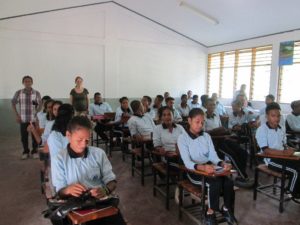
Presentation at the Vocational School with teacher Faustino, May 2017.
The work in Vila Maumeta reflects needs at the national level; it is necessary to improve governance by including research institutions, NGOs, international development agencies and most importantly, local communities in drafting conservation policy frameworks that state in detail the role of tara bandu practices for terrestrial and marine conservation.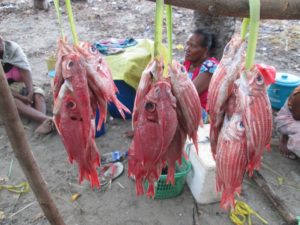
Tara bandu can be included in policies as a Local Level Fishery and Terrestrial Regulatory Approach. This would ensure a bottom-down approach to conservation, requiring the knowledge of natural resource management and social-ecological systems in order to assess conservation projects from multiple perspectives.
References
- Belun/The Asia Foundation (2013). Tara Bandu: Its Role and Use in Community Conflict Prevention in Timor-Leste.
- Coral Triangle Knowledge Network (2018). ADB Team Visits Fishing Village in Timor-Leste to Establish Marine Protected Areas.
- CIA (2017). The World Factbook: Timor-Leste. https://www.cia.gov/library/publications/the-world-factbook/geos/print_tt.html
- Constitution of the Democratic Republic of Timor-Leste. http://timor-leste.gov.tl/wp-content/uploads/2010/03/Constitution_RDTL_ENG.pdf
- Democratic Republic of Timor-Leste (2011). Programme of Work on Protected Areas.
- Democratic Republic of Timor-Leste (2011). The National Biodiversity Strategy and Action Plan of Timor-Leste (2011 2020).
- Democratic Republic of Timor-Leste (2013). Agriculture Sector Development: Medium Term Operation Plan (2014 – 2018).
- Poblacion, E. A., Rodrigues, P. & Lee, R. (2016). Tara Bandu as a coastal and marine resource management mechanism: A case study of Biacou, Timor-Leste. FAO.
- Timor Leste Population (2018). http://www.citypopulation.de/php/timor-admin.php?adm2id=060401
Acknowledgements
Our gratitude to the Vila Maumeta community members, in special to the teacher Faustino Barros, the Vila Maumeta village chief Filipe Ximenes, Roman Luan NGO, and the support of CCRN and Dr. Tony Charles.



